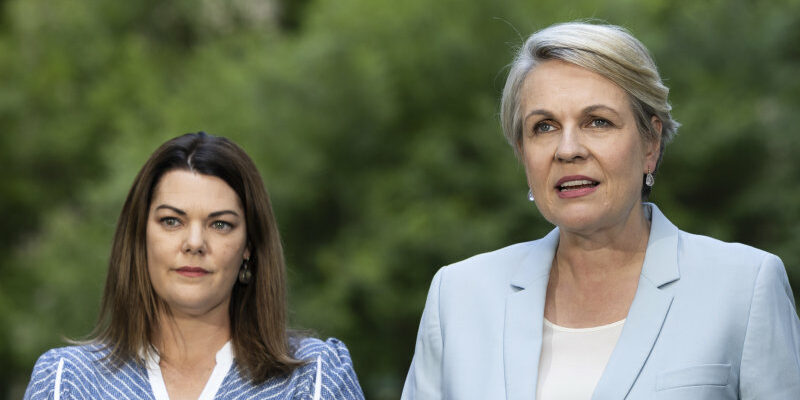Save articles for later
Add articles to your saved list and come back to them any time.
A boom in wind and solar farms will transform Australia into a clean energy superpower, the Albanese government says, despite a 30 million tonne surge in coal exports that risks the Greens’ support for its proposed environmental protections.
Environment Minister Tanya Plibersek said on Tuesday the government had notched up a major milestone, with enough wind and solar farms under approval to supply the average electricity consumption of 2 million homes at the same time.
Environment and Water Minister Tanya Plibersek (right) and Greens Senator Sarah Hanson-Young.Credit: Alex Ellinghausen
Plibersek said since coming to power last May, Labor had ended the Morrison government’s climate action “denial and delay”.
“Australia can be a renewable energy superpower,” she said. “We’re focused on boosting renewables and making up for lost time.”
However, federal government statistics released on Monday forecast that the volume of coal exports from existing mines would grow by 9 per cent in 2023-24. Exports of thermal coal, used in power plants, are expected to rise to 182 million tonnes, while exports of metallurgical coal, used in steel making, are forecast to reach 156 million tonnes.
A Resources Department report also revealed that the combined value of coal, gas and oil projects that private companies had made a financial commitment to develop had reached $40 billion.
Plibersek said Australia would now be less reliant on fossil fuels if it weren’t for the political fights of the last decade.
“We need reliable, clean energy in the grid. That’s what we’re doing,” she said.
The federal government is rolling out its Capacity Investment Scheme, likely to run into the tens of billions of dollars, to underwrite private investment in renewables and drive clean energy’s share of the grid to 82 per cent of electricity generation by 2030. Renewables generated about 38 per cent of electricity in the past year, while 57 per cent came from coal and 5 per cent from gas.
While the government pushes ahead with renewable projects, Plibersek has also granted final approval to four coal projects since May 2022 while vetoing several others.
At the same time, she has promised to reform national environment laws to beef up protections for wildlife including through the approval process for new projects. The government is aiming to introduce the changes to parliament next year and is expected to rely on the Greens’ support in the Senate to pass them into law.
But Greens environment spokesperson Sarah Hanson-Young said “fit-for-purpose” environment laws must include a provision to block projects that drove climate change.
“If those laws don’t include an assessment of the climate damage of projects before they’re given a green light, if they don’t stop native forest logging, then they’re not worth the paper they’re written on,” Hanson-Young said.
“You can’t put out the fire if you keep pouring petrol on it and you can’t have environment laws that allow new coal and gas projects.”
Climate Change and Energy Minister Chris Bowen said at the recent climate talks in Dubai that fossil fuel production must eventually cease in order to achieve the Paris Agreement goal – to which Australia is a signatory – of limiting global warming to 1.5 degrees.
But the government has refused to rule out approving new projects.
Australian Energy Producers chief executive Samantha McCulloch, who represents gas companies, said the government must make it easier for developers to deliver the $40 billion list of committed projects.
“The pipeline of new gas projects highlights the importance of policy settings and regulatory certainty to unlock investment in new supply.”
Cut through the noise of federal politics with news, views and expert analysis from Jacqueline Maley. Subscribers can sign up to our weekly Inside Politics newsletter here.
Most Viewed in Politics
From our partners
Source: Read Full Article

